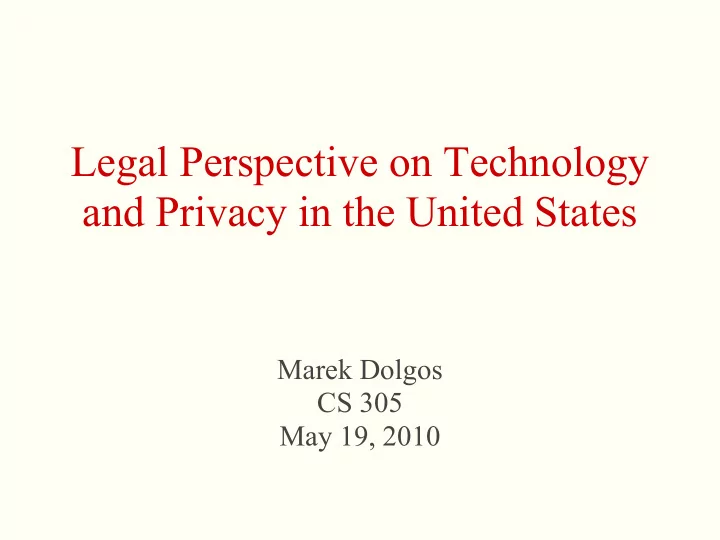

Legal Perspective on Technology and Privacy in the United States Marek Dolgos CS 305 May 19, 2010
First Amendment Congress shall make no law respecting an establishment of religion, or prohibiting the free exercise thereof; or abridging the freedom of speech, or of the press; or the right of the people peaceably to assemble, and to petition the Government for a redress of grievances. [1]
Fourth Amendment The right of the people to be secure in their persons, houses, papers, and effects, against unreasonable searches and seizures, shall not be violated, and no Warrants shall issue, but upon probable cause, supported by Oath or affirmation, and particularly describing the place to be searched, and the persons or things to be seized. [1]
Roy Olmstead Roy was a bootlegger in the 1920's. He was convicted by evidence gained from wiretapping and recording his telephone conversations. [3] [5]
Chief Justice W. H. Taft Roy argued that his conversations where protected by the Fourth Amendment. His case made it to the Supreme Court, he lost. Justice Taft's argument was based on fidelity. Because the evidence was sized by hearing only, there was no trespass. [3]
Justice Brandeis Four judges dissented the decision on Roy's case, justices Brandeis, Holmes, Stone, and Butler. Justice Brandeis' argument was based on fidelity. He agreed that when written the Fourth Amendment only applied to trespass. But it did so because at its time trespass was the technology to invade privacy. [3]
Charles Katz Charles was a gambler in the 1960's. He placed bets from California over the telephone to Boston and Miami. He was convicted by evidence gained from wiretapping and recording his conversations. [3] [6] Charles' case also made it to the Supreme Court, he won.
Harvard Law Professor L. Tribe As a law clerk to the Supreme Court working on the case he later recollected that the decision was made by seven justices due in part: ...the First Amendment purposes of protecting free speech, as well as the Fourth Amendment purposes of protecting privacy require treating as “search” any invasion of a persons ... telephone conversations.... [2]
Mark Klein In 2006 Mark acted as a whistle-blower, revealing AT&T's cooperation with the NSA on a dragnet wiretapping system of all Internet traffic passing through AT&T's San Francisco 611 Folsom Street facility. [4]
? vs. United States Mark Klein's disclosure of the AT&T and NSA wiretapping effort opened doors for lawsuits. No defendant has thus far been able to show they were personally wiretapped, in part because the program is protected by state secret, hence none have been able to take their case to court. The current legal situation in regards to Internet surveillance is still undecided...
References [1] United States Constitution, Bill of Rights. Cornell University Law School. Retrieved (May 19, 2010) from http: //topics.law.cornell.edu/constitution/billofrights [2] Tribe, L.H. (1991). The Constitution in cyberspace: law and liberty beyond the electronic frontier. Retrieved (May 14, 2010) from http://epic.org/free_speech/tribe.html [3] Lessig, L. (2006). Code v2.0. New York: Basic Books. [4] Klein. M (2006). Declaration of Mark Klein in Support of Plaintiffs' Motion for Preliminary Injunction. Retrieved (May 14, 2010) from http://www.eff.org/files/filenode/att/SER_klein_decl.pdf [5] Elise and Roy Olmstead, Seattle, 1925. University of Washington Libraries Digital Collections. Retrieved (May 11, 2010) from http://content.lib.washington.edu/cgi-bin/viewer.exe? CISOROOT=/imlsmohai&CISOPTR=892&CISORESTMP=&CISOVIEWTMP= [6] Katz vs. United States. Wikipedia.org. Retrieved (May 11, 2010) from http://en.wikipedia.org/wiki/Katz_v. _United_States
Recommend
More recommend